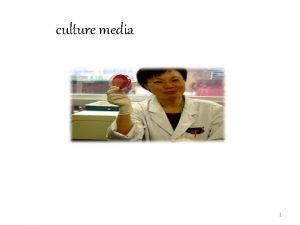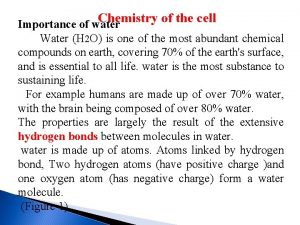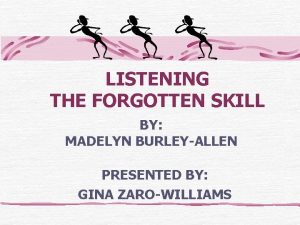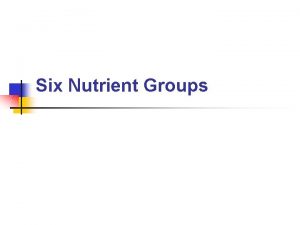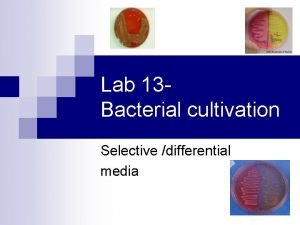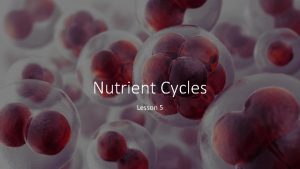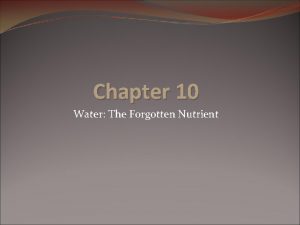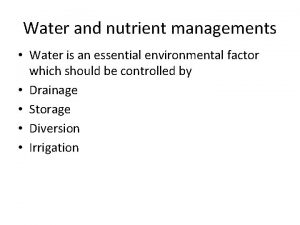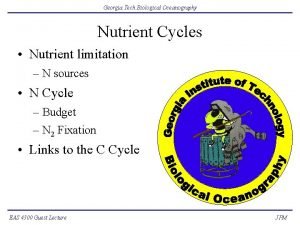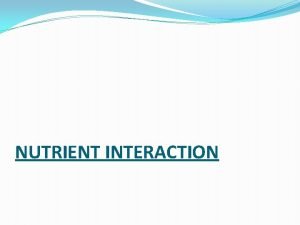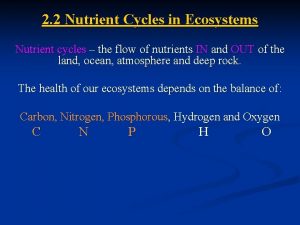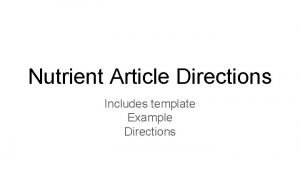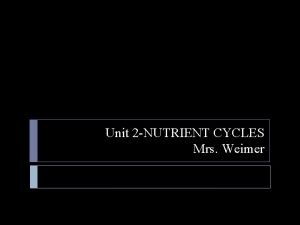Water The forgotten nutrient Water is an essential





















- Slides: 21

Water The forgotten nutrient

• Water is an essential nutrient that must be replaced every day. • You may be able to survive 2 -3 weeks without food, without water only a few days.

Vital Functions of Water • Found in every cell in the body. • For most adults, body weight is about 50 -70 percent water. That equals about 10 -12 gallons.

Vital Functions of Water cont. • Body fluids include saliva, blood, lymph, digestive juices, urine, and perspiration. – Water is the main component in each of these fluids. § Your diet must include adequate amounts of water to allow your body to form enough fluids. – Without water intake you cannot produce enough sweat to cool you off so you can get headaches, nausea, or dizziness.

Vital Function of Water cont. • Helps chemical reactions take place. • Carries nutrients to and waste products from cells throughout the body. • Reduces friction between surfaces. • Controls body temperature

Helps with Chemical Reactions • This includes the reactions involved in breaking down carbs, fats, and proteins for energy. • Also includes reactions that results in new compounds like nonessential amino acids. • Water is a reactant in many chemical reactions in the body. – A reactant is a substance that enters into a chemical reaction and is changed by it.

Transports Nutrients & Waste Products • Water is a solvent. –Solvents are liquids in which substances can be dissolved. –Water can dissolve most substances, including amino acids from proteins, glucose from carbs, minerals, and watersoluable vitamins.

Waste Products • Blood is primarily made of water. • Water also plays a role in removing wastes from the body through perspiration, exhaled water vapor, and feces.

Lubricates Surfaces • Reduces the friction between surfaces. • Water is an excellent lubricant in your body. – The water in saliva lubricates food as you swallow it. – Tears lubricate your eyes. – Fluids surround your joints to keep bones from rubbing against each other. – Cushions vital tissues and organs to protect them from injury.

Regulates Body Temperature • Blood and perspiration are the body fluids responsible for this task. – Normal body temp is 98. 6 F. Temperatures that are above or below this by 5 F can cause serious health problems. – Ex: Your riding a stationary bike and your whole body becomes hot. This is because blood distributes body heat.

Keeping Fluids in Balance • Throughout the body, there needs to be a balance between water intake and water excretion. • Intracellular water is the water inside your cells. • Extracellular water is the water outside your cells.

The Source of the Body’s Water Supply • Most people need 2 -3 quarts of water per day to replace body fluids. • You meet these needs through the liquids you drink and the foods you eat. – Milk, soft drinks, juices, broth, and tea have high liquid contents. – Summer squash, watermelon, butter, and margarine also have water.

• 12% of your water needs are met through metabolism. • When carbs, fats, and proteins are broken down in the body, some water is released.

Bottled VS. Tap • Bottled water sales have increased. • The cost is several hundred times high than tap water. • Bottled water is no healthier than safe, clean, pure tap water.

Why do we buy bottled water? • We think… –It contains more minerals (doesn’t) –Taste better than tap. –Tap has contaminants –What else?

Can you drink too much water?

• Yes! The result is a rare condition called water intoxication. – People who regularly drink excessive amounts of water usually do so because of a psychological disorder. – Drinking lots of water can dilute electrolytes in the extracellular fluid. You can experience headaches, muscle weakness, and death.

How is Body Water Lost? • Occurs naturally as you carry on regular activities throughout the day. – On avg. you lose 2 -3 quarts of fluid each day. – Most fluid is lost through urine. Also through sweat, you lose moisture in your breath as you breathe, and small losses through bowel waste.

Factors that Increase Water Losses • Dry climates • Illness • Exercise • Diuretics –Substances that increase urine production (coffee and soft drinks do this too)

Effects of Water Loss • When you lose water, you lose weight – However the weight you want to lose is fat, not water! – Water weight is quickly regained when fluids are replenished. – If you do not replace water loss you may become dehydrated (lower than normal body fluid levels)

Guidelines • • • Drink 6 -8, 8 oz. glasses of liquids daily Thirst is the first sign you need water When it is hot DRINK WATER! Pregnant women need more water. Dark yellow urine indicates a high concentration of wastes (this is stressful to your kidneys) • Light color urine shows you are drinking enough to keep wastes flushed out of your body.
 Example of complex media
Example of complex media Water and water and water water
Water and water and water water Plamatic acid
Plamatic acid The resourceful citer
The resourceful citer Misinformer plagiarism
Misinformer plagiarism Listening the forgotten skill
Listening the forgotten skill Once met never forgotten
Once met never forgotten Siachen the forgotten war
Siachen the forgotten war Yanggongju
Yanggongju Education is what remains
Education is what remains Youtube darryl worley
Youtube darryl worley Not forgotten carry
Not forgotten carry Unborn but not forgotten
Unborn but not forgotten Expenseondemand
Expenseondemand Forgotten altar
Forgotten altar Forgotten core circuitry disassembler
Forgotten core circuitry disassembler Can hypnosis force people to act against their will
Can hypnosis force people to act against their will A. profunda brachii
A. profunda brachii Nutrient cycle of a tropical rainforest
Nutrient cycle of a tropical rainforest What are the six nutrient groups
What are the six nutrient groups Nutrient agar with tellurite is selective/differential for
Nutrient agar with tellurite is selective/differential for Nutrient additive eggs
Nutrient additive eggs
